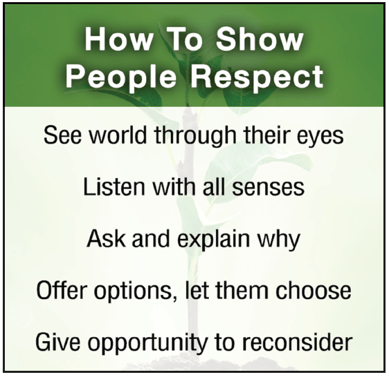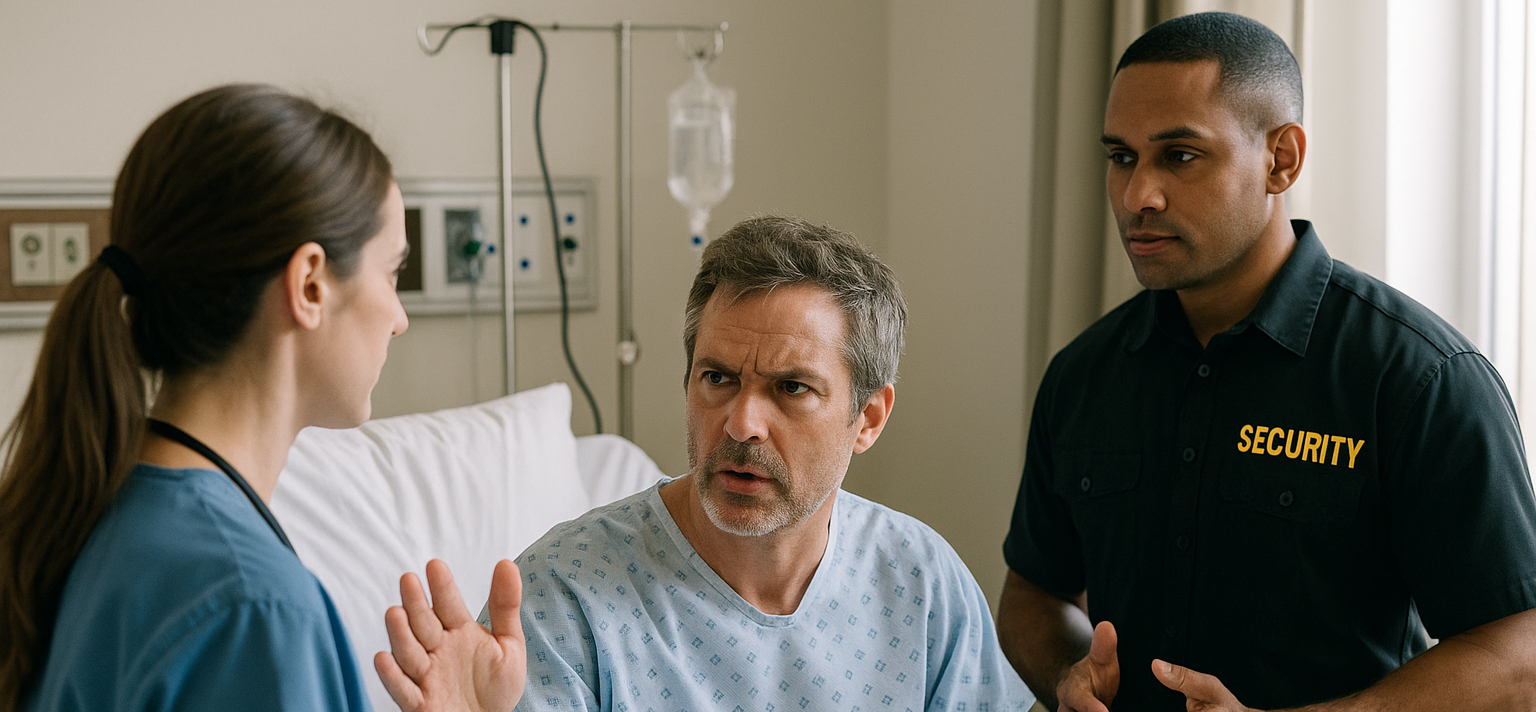In healthcare environments, personal protective equipment (PPE) is non-negotiable. No responsible clinician would examine a patient with a highly contagious disease without donning the appropriate gloves, gown, mask, or even powered air-purifying respirators when necessary. These physical barriers protect healthcare workers from biological threats that could cause serious harm.
But what about the psychological threats that healthcare workers face daily? The verbal aggression, emotional stress, and interpersonal conflict that can be just as damaging as physical hazards? For these invisible but equally harmful exposures, respectful communication serves as essential PPE for the mind—protection that every healthcare worker needs but too few receive adequate training to use effectively.
As we observe National Safety Month this June, it's worth examining how respectful communication protects healthcare teams emotionally and psychologically, and how organizations can embed respect-based training into their broader safety strategy.
The Psychological Hazards of Healthcare
Healthcare workers face numerous psychological exposures in their daily work:
External Exposures:
- Verbal aggression from patients and families
- Traumatic events and medical emergencies
- Ethical dilemmas and moral distress
- Exposure to suffering and grief
Internal Exposures:
- Lateral violence from colleagues
- Hierarchical intimidation
- Chronic stress and burnout
- Compassion fatigue
The impact of these exposures is well-documented:
- Mental health conditions including anxiety, depression, and PTSD
- Substance abuse and dependency
- Career abandonment and early retirement
- In severe cases, suicidal ideation and attempts
Just as biological hazards require physical PPE, these psychological hazards demand protective measures—and respectful communication serves as the first line of defense.
Respect as Protective Equipment
At Vistelar, we define respect not as an attitude but as a set of behaviors that protect both the giver and receiver from psychological harm. When viewed through this lens, respect functions remarkably similarly to physical PPE:
receiver from psychological harm. When viewed through this lens, respect functions remarkably similarly to physical PPE:
It Creates a Barrier
Respectful communication creates psychological distance between the healthcare worker and potential emotional harm. By maintaining professional boundaries through structured verbal interactions, clinicians can engage with difficult situations without absorbing their full emotional impact.
It Prevents Contamination
Just as physical PPE prevents cross-contamination, respectful communication prevents the spread of toxic interactions throughout a team or organization. When one person maintains respectful communication despite provocation, they stop the cycle of escalation that might otherwise infect an entire department.
It Requires Proper Technique
Like physical PPE, respectful communication must be applied correctly to be effective. Improper application—such as using respectful words with dismissive tone or body language—creates vulnerabilities just as surely as a poorly fitted mask.
It Needs Regular Replacement
The protective effect of respectful communication isn't permanent. Healthcare workers must continually refresh their approach, especially during extended or particularly challenging interactions.
It Serves Multiple Parties
PPE protects both the wearer and those they contact. Similarly, respectful communication protects both the healthcare worker and the recipient, creating mutual psychological safety.
The Five Approaches to Showing Respect
In our conflict management training, we teach five specific approaches to showing respect that serve as psychological PPE:
1. See the world through their eyes 
This approach involves genuine empathy—attempting to understand the other person's perspective, concerns, and needs:
- "What must this experience be like for them?"
- "What might be causing this reaction?"
- "What needs might be unmet in this situation?"
This perspective-taking creates distance between the healthcare worker and potentially harmful personal reactions like defensiveness or anger.
2. Listen with all your senses
Comprehensive listening involves:
- Hearing words and tone
- Observing body language and facial expressions
- Noticing environmental factors
- Sensing emotional undercurrents
This multi-sensory awareness helps healthcare workers identify potential threats early and respond appropriately, rather than reacting emotionally.
3. Ask and explain why
Clear explanations protect against misunderstandings that can escalate into conflict:
- Making requests rather than issuing commands
- Providing context for policies or procedures
- Explaining limitations or constraints
- Offering rationales for decisions
This transparency reduces friction and prevents the defensive reactions that can harm healthcare workers psychologically.
4. Offer options, let them choose
Providing choices whenever possible:
- Presents alternatives within necessary constraints
- Shares control appropriately
- Reduces resistance and opposition
- Increases cooperation and compliance
This approach diffuses potential power struggles that can become psychologically taxing.
5. Give opportunity to reconsider
Allowing face-saving second chances:
- Recognizes that initial reactions may be impulsive
- Provides space for reconsideration
- Acknowledges human fallibility
- Demonstrates goodwill
This prevents escalation cycles that can cause significant psychological distress.
Embedding Respect-Based Training in Safety Strategy
To fully integrate respect as psychological PPE into organizational safety culture, consider these implementation strategies:
1. Frame respect as safety equipment, not just customer service
When respect is presented as essential safety equipment rather than simply "being nice," its importance becomes clearer. Training should explicitly connect respectful communication to psychological safety and well-being.
2. Include psychological safety in risk assessments
Expand traditional safety assessments to include evaluation of:
- Team communication patterns
- Prevalence of disrespectful interactions
- Verbal de-escalation capabilities
- Response protocols for emotionally charged situations
3. Develop competency-based respect training
Move beyond awareness to skill development:
- Specific verbal and non-verbal techniques
- Scenario-based practice opportunities
- Competency verification
- Regular skill refreshers
4. Create respect equipment "checkpoints"
Just as organizations have PPE checkpoints for clinical areas, establish:
- Team communication check-ins at shift changes
- "Timeout" protocols for escalating situations
- Regular debriefing after difficult interactions
- Peer observation programs for communication skills
5. Measure respect-related safety outcomes
Track metrics that demonstrate the protective effect of respectful communication:
- Verbal de-escalation success rates
- Staff psychological wellness indicators
- Correlation between communication quality and other safety events
- Emotional harm incident reporting
Building Organizational Capacity
Developing respect as organizational PPE requires systematic effort:
Leadership Development
Leaders must understand and model respect as protective equipment:
- Demonstrating the five approaches in all interactions
- Addressing disrespectful behavior promptly
- Supporting skill development throughout the organization
- Recognizing effective use of respectful communication
Environmental Support
Create environments that facilitate respectful interactions:
- Physical spaces that allow for private conversations
- Visual reminders of communication techniques
- Resources for managing difficult interactions
- Quick-reference guides for de-escalation
Psychological PPE Training
Develop comprehensive training programs:
- Initial training for all staff
- Advanced training for high-risk roles
- Refresher sessions integrated into existing safety training
- Specialized modules for specific challenges (e.g., dementia care, mental health)
Support Systems
Establish resources for when psychological PPE fails:
- Peer support programs
- Post-incident debriefing protocols
- Access to professional counseling
- Return-to-work support after difficult encounters
Case Study: Respect as PPE in Action
A large urban healthcare system implemented a comprehensive respect-based training program framed explicitly as psychological PPE. Their approach included:
- Initial four-hour training for all staff in the five approaches to showing respect
- Regular 15-minute skill refreshers during team meetings
- Visual cues throughout facilities reminding staff of key techniques
- Integration of respect metrics into safety dashboards
After 18 months, they reported:
- 42% reduction in reported verbal aggression incidents
- 31% decrease in staff turnover in previously high-conflict departments
- 28% improvement in staff psychological wellbeing measures
- Significant increase in patient satisfaction scores related to communication
Most importantly, staff began to view respectful communication not as an optional "soft skill" but as essential protective equipment for their psychological well-being.
The Universal Benefit
For organizations looking to address lateral violence as a safety issue, consider this phased approach:
Unlike some safety measures that protect specific individuals in specific circumstances, respectful communication as PPE benefits everyone in the healthcare environment:
For Direct Care Providers:
- Protection from verbal aggression
- Reduced emotional labor
- Decreased burnout risk
- Improved professional satisfaction
For Support Staff:
- Increased inclusion in team communication
- Better protection from lateral violence
- Enhanced sense of value and respect
- Reduced workplace stress
For Patients and Families:
- More consistent, professional interactions
- Reduced anxiety in stressful situations
- Better information exchange
- Increased trust in healthcare team
For Organizations:
- Lower turnover and associated costs
- Decreased absenteeism
- Improved reputation and patient satisfaction
- Reduced liability exposure
The Path Forward
This National Safety Month, consider how your organization might strengthen its approach to psychological PPE through respect-based training. Just as you would never send healthcare workers into high-risk situations without appropriate physical protection, don't send them into emotionally charged interactions without the protective equipment of structured, respectful communication skills.
By embedding respect-based training into your broader safety strategy, you create a more complete approach to workplace protection—one that safeguards not just the body but the mind and spirit of every healthcare worker. In doing so, you build an environment where everyone can perform at their best, even in the most challenging circumstances.







